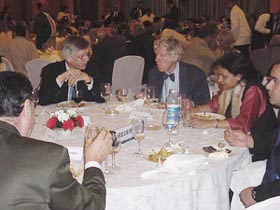 
Ambassador Arne Walther underlined the
importance of energy for economic and social development, and preservation of natural
resources for sustainable development. He said that though coal is available in abundance,
its use as a primary source of energy is causing concern for climatic change. He expressed
need for active participation between India and Norway as Norway meets its electricity
needs through clean hydro-electricity and India has competence in the development and use
of renewable sources of energy.
Mr Suresh P Prabhu congratulated TERI for
holding DSDS 2002 and taking the initiative ofputting the issues of sustainable
development at the forefront—literally forcing the government to ‘act
correctly’. He expressed solidarity with the concerns raised and hoped that the event
will be held annually.
He said that world has to act as a
‘unified ecosystem’ and think of ensuring concrete global actions to address the
environmental issues. Talking on India’s initiatives, he said that though there are
no obligations for the country to reduce the emissions of greenhouse gases, the country
has been doing so voluntarily and umpteen policies and environmental laws have been framed
to support it. He explained how the country is trying to increase the use of renewable
energy for power generation and achieve the global communities’ commitment to
‘provide electricity to all’ on its own.
He concluded with a strong emphasis on
Rio + 10 providing support to countries like India that have not signed the
treaty but are generating green power and addressing the challenges of sustainable
livelihood. He reiterated that providing technology options to such nations can only be
the foundation of peace in world and expressed hope that global community will not
disappoint him and Rio + 10 will bring new options and aspirations.
|